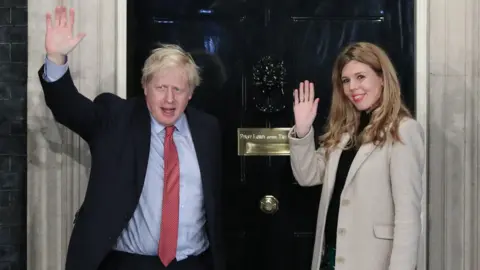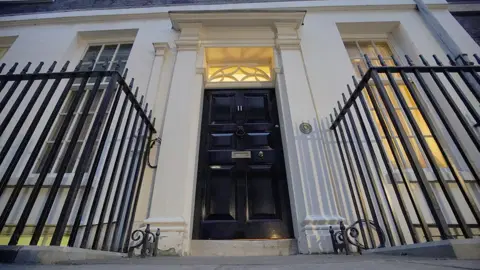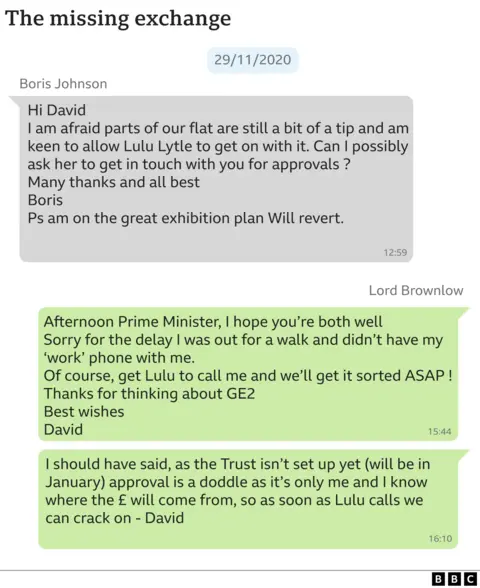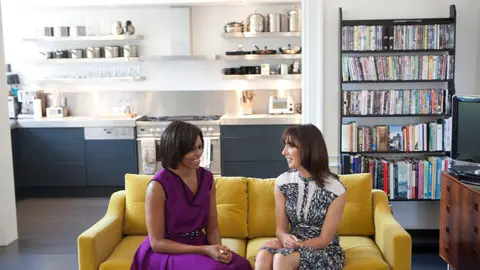Downing Street refurbishment: What is the row about?
 PA Media
PA MediaFurther questions have been asked about the funding of home improvements at the prime minister's Downing Street flat, following the release of an exchange of letters with his standards adviser.
Lord Geidt complained about not having been shown WhatsApp messages between Boris Johnson and Tory donor Lord Brownlow, which talked about the refurbishment.
What's the row about?
Boris Johnson and Carrie Symonds had work carried out on their private residence, the flat above 11 Downing Street.
The prime minister receives an annual public grant of £30,000 to spend on his living quarters. But the work cost considerably more than that - at least £112,000 based on the amount we know Lord Brownlow contributed.
The work was initially paid for by the Cabinet Office, but £52,000 was given to the Conservative Party by Lord Brownlow to cover the bills. Mr Johnson says he has now covered all the costs out of his own pocket.
The Conservative Party was fined £17,800 after the Electoral Commission found it had failed to accurately declare all of Lord Brownlow's donations towards the renovation.
What did the Electoral Commission say?
Lord Brownlow was asked in May 2020 to set up a Downing Street trust that would fund renovations to the flat above 11 Downing Street, but that trust was never established.
In November 2020, the prime minister approached Lord Brownlow by WhatsApp message to approve payments to the interior designer carrying out the work.
The Electoral Commission found in December 2021 that the subsequent £52,000 payment from Huntswood Associates Ltd, whose director is Lord Brownlow, had not been properly recorded and that it should not have been described as a loan or as part of a trust.
But it said that separate payments of almost £60,000 for the refurbishments made by Lord Brownlow directly to suppliers, did not need to be declared.
The Electoral Commission report led to further controversy because it referred to an exchange of WhatsApp messages between the prime minister and Lord Brownlow, which had not been seen by the adviser on standards, Lord Geidt, when he had reported on the case earlier in the year.
 PA Media
PA MediaWhat did Lord Geidt say?
Lord Geidt's report in May had concluded that Mr Johnson did not break the ministerial code over the funding of the renovations.
But he said: "The prime minister - unwisely, in my view - allowed the refurbishment of the apartment at No 11 Downing Street to proceed without more rigorous regard for how this would be funded."
Lord Geidt added: "The record shows no evidence that the prime minister had been informed" about the payments. His report says that when he found out in February 2021, Mr Johnson "settled the full amount himself".
But when Lord Geidt found out about the messages to Lord Brownlow, he wrote to the prime minister saying that while his overall conclusions about the ministerial code were unchanged, had he seen the messages, "I doubt whether I would have concluded, without qualification... that 'at the point when the prime minister became aware, he took steps to make the relevant declaration and to seek advice'."
Mr Johnson replied, offering a "humble and sincere apology" for not giving him the messages, blaming security issues which had forced him to change his phone.
Why is this controversial?
If a politician accepts money from a donor - either as a gift or as a loan - they are expected to make that information public, normally within 28 days.
The concern is that if a financial gift is kept secret, it might be used to gain favours or political influence.
This is the exchange of messages between Mr Johnson and Lord Brownlow:

At the end of his message, Mr Johnson refers to the "great exhibition plan", which was a proposal for a cultural festival, which Lord Brownlow was involved with as a trustee of London's Albert Hall.
Lord Brownlow met Oliver Dowden, who was then culture secretary, to discuss the event six weeks after the text exchange with the prime minister, according to the meeting log. In the end, the exhibition did not happen, but Labour says Lord Brownlow's November 2020 text exchanges with the PM are still important.
"Lord Brownlow appears to have access to the prime minister because he was paying for the flat renovations. If that is the case, that is corruption," the party said.
The BBC has approached Lord Brownlow for comment but he has not yet responded.
Business Minister Paul Scully denied that the prime minister was linking support for a Great Exhibition with financial support for flat renovations in his messages.
He said the Great Exhibition plan was passed to "the right channels" at the culture department and that Mr Johnson "had no idea" who would be paying for the flat refurbishments, believing the funding would come through a blind trust.
Why does the PM live next door to No 10?
Like several of his recent predecessors, Mr Johnson and Ms Symonds are living at No 11 because the four-bedroom flat there is much larger than the one above No 10.
Tony Blair was the first prime minister to live at No 11 - he and his wife Cherie turned the space into a family home.
The Grade 1-listed flat was then extensively refurbished by David and Samantha Cameron in 2011 at a cost of £30,000.
 Getty Images
Getty ImagesThe latest upgrade for the flat was carried out by interior designer Lulu Lytle.
Mr Johnson and his wife wanted to transform the flat from previous Prime Minister Theresa May's "John Lewis furniture nightmare" into a "high society haven", according to the society magazine Tatler.
